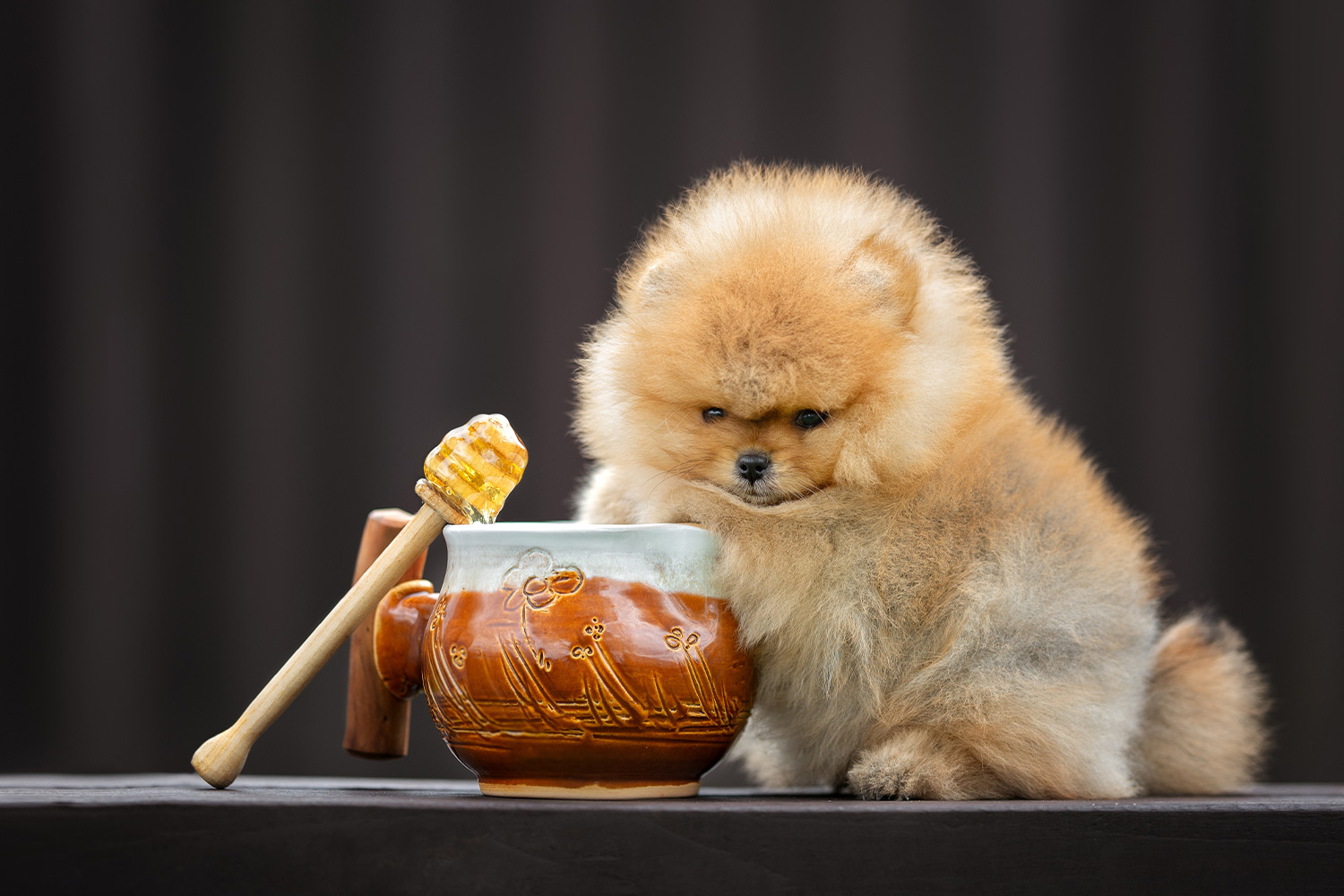The golden-hued nectar that bees make, known as honey, is a widely recognized representation of sweetness and the goodness of nature. People have cherished its delectable flavor and possible health advantages for ages. Can our dog friends partake in this delicious treat, though? There is more to the question “can dogs have honey” than just a simple yes or no. Now let’s explore the world of honey and how it affects the health of your dog.
Honey’s Nutritional Content
Most people know honey for being sweet. There to 80% of it is sugar, like fructose and glucose. Even though these sugars are natural and healthy, feeding dogs too much honey can pose some problems. It may lead to weight gain, tooth issues, and possibly even diabetes.
Beyond the sugars, honey boasts a small amount of other components:
- Comprises about 17% of Water
- Minerals: Honey contains trace amounts of minerals like calcium, potassium, magnesium, sodium, and phosphorus.
- Honey contains small quantities of vitamins B6,
- Honey contains antioxidants like phenolic acids and flavonoids
Can Dogs Have Honey ? The benefit
However it’s not a dietary necessity, honey could potentially offer unique benefits for dogs under specific circumstances:
- Soothing a Cough: The dogs owners believed that Honey reduce mild coughing in dogs due to its germ-killing traits. It’s important though, to check with your vet before trying any home remedies. He can recommend safer, more potent dog cough suppressants.
- Wound Healing : Honey may help heal small skin cuts in dogs due to its antibacterial components. But yous should keep in mind: For bigger injuries, going to the vet and getting prescribed antibiotics is key. We should never use honey on open sores unless a vet says it’s okay.
- Energy Boost: Honey’s sweet taste comes from its high sugar, giving a speedy surge of energy. But remember, this is short-lived and can result in low energy later. Want lasting pep in your pup? Feed them a balanced diet rich in complex carbs.
Weighing the Risks: Can Dogs Have Honey Safely ?
Yes there is potential benefits, But there is also some risk for our friendly pets if they have honey :
- Obesity : Honey’s sweet taste, due to lots of sugar, might cause weight increase. Dogs inclined towards getting heavy can be more affected.
- Dental Problems: Sugars in honey can help bacteria to grow in the mouth, And this will cause to tooth decay and gum disease.
- Botulism: Honey can have spores of Clostridium botulinum, this bacteria that causes botulism. While rare, puppies under one year old are particularly susceptible to botulism poisoning.
When Can Dogs Have Honey ? Moderation is Key
Can dogs eat honey then? Basically, it’s okay for dogs to have honey, but only a little bit and under specific conditions. Here’s the scoop :
- Healthy Adult Dogs : Now and then, less than a spoonful of honey could be okay for a healthy grown dog. Even so, asking your vet is always a good idea.
- Puppies : For puppies under one year old is not acceptable ue to the risk of botulism poisoning
- Overweight or Diabetic Dogs : For puppies under one year old is not acceptable ue to the risk of botulism poisoning
Sweeter Alternatives to Honey for Dogs
If you want best way to add your dog’s sweet toth, there is safe alternative and healthier food :
- Fruits: Can Dogs Eat Bananas , Blueberries, strawberries, and bananas are some fruits that are naturally rich in sweetness and loaded with vitamins. Just remember, give them in balance as they have sugars too.
- Sweet Potato: Feeding your dog mashed sweet potatoes is good idea because it’s delicious and healthy treat rich in vitamins and fiber
- Homemade Dog Treats : Plenty of recipes on the internet are dog-friendly. They feature things like applesauce, pumpkin puree, and whole wheat flour. These help give pups a sweet kick without any honey-related hazards.
Can Dogs Have Honey? Proceed with Caution
Honey can feel like a sweet snack, but be careful when giving it to your pet pooch. The high sugar level often overshadows any good parts. Many other options, both safer and healthier, can keep your dog‘s love for sweets happy.
Always chat with your vet before adding something new to your dog’s meals.
